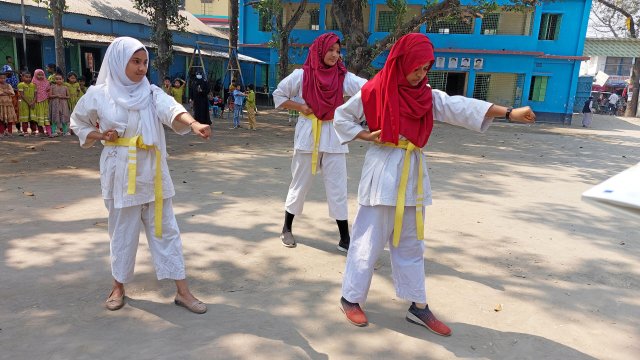Training in the schoolyard: Tasmin (r.) and her classmates in Rangpur
Photo: Felix Lill
Tasmin Toraiya Ohi looks straight ahead as she prepares her colleagues for the exercises. It is shortly after 10 a.m. in Rangpur, a city of 300,000 in northern Bangladesh. At secondary school Gangachara At first glance, everything in the city center is as usual: the little ones are running wildly across the schoolyard, the older girls and boys tend to spend the break in separate groups and giggle.
But then, in the middle of the sandy yard, there is the group around 13-year-old Tasmin Toraiya Ohi, all dressed in white suits – they are training karate. “We do this every day,” says the adolescent with visible pride on her face. »We finally received the yellow belt recently. We love playing sports!”
And in Bangladesh that is a statement. Because girls don’t actually do any sports here. At least that’s the tradition – but it’s been broken at this school for six years. The humanitarian non-governmental organizations have been leading since 2018 Care and Plan – supported with funds from the European Union and the Austrian Development Agency – here the so-called JANO-Project through.
In addition to improving the nutritional situation in times of climate change, the role of girls and women should be strengthened – so that they can also contribute their knowledge when the country needs to modernize. Sport should act as an important lever for this, says teacher Shafiqul Alam, who watches the girls from a distance: “Through the project, we have also introduced a subject that not only teaches the children the basics of a healthy diet, but also how to deal with it Puberty helps.”
Something like this is new in Bangladesh – similar to sports for girls, especially martial arts. Girls – and only girls – are now being trained in karate in 331 schools in the region. Why? The teacher Shafiqul Alam explains this using an anecdote: “Girls and boys have lessons together, but so far they have always been separated from each other.”
Shafiqul Alam believes that karate has made the girls more self-confident. 13-year-old Tasmin confirms this: »I feel stronger now. When I go out alone, I used to sometimes be afraid that I would be attacked. But now I can defend myself.” At the beginning, a few boys made fun of her. “Now they are more afraid of us when they see our kicks and punches in the schoolyard.”
The fact that girls’ sports have so far been taboo in Bangladesh may come as a surprise when you look at the role of women in society in general. In the »Gender Gap Report« According to the World Economic Forum, which compares gender equality internationally in various areas of society, Bangladesh is at least in the global average.
The country has been ruled by a woman for 15 years. And the most important export industry is the textile sector, in which women work primarily. The World Economic Forum writes: “Iceland and Bangladesh are the only countries where women have held the highest political office in the country for more years than men.” With the highest gender equality in South Asia, Bangladesh ranks “59th in the world.”
In the “political participation” category, Bangladesh even ranks seventh worldwide. But in sports, the predominantly Muslim country of 175 million has so far been known for the fact that girls and women hardly enjoy participation. A few years ago, the Turkish broadcaster TRT reported in its international program about girls interested in sports in Bangladesh: “They often face resistance from their parents and the broader society, which would rather see them married young; in a nation where women already face numerous hurdles just wanting to play sports.”
But something is happening. Cricket, by far the most popular sport in Bangladesh, has had a women’s national team since 2007. TRT’s report mentioned a woman who worked as a coach for a men’s soccer team in 2022. If Tasmin Toraiya Ohi had his way, Bangladesh could soon professionalize karate too: “I would like to go to the Olympics. I would train hard for that too. I’m now teaching karate to my sister and a few friends.”
The research was supported by the NGO Care.
Become a member of the nd.Genossenschaft!

Since January 1, 2022, the »nd« will be published as an independent left-wing newspaper owned by the staff and readers. Be there and support media diversity and visible left-wing positions as a cooperative member. Fill out the membership application now.
More information on www.dasnd.de/genossenschaft
